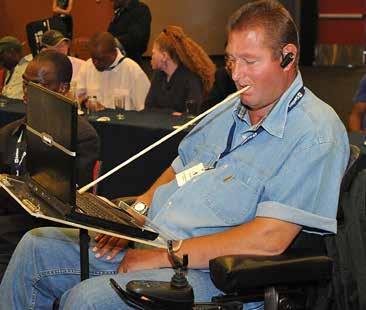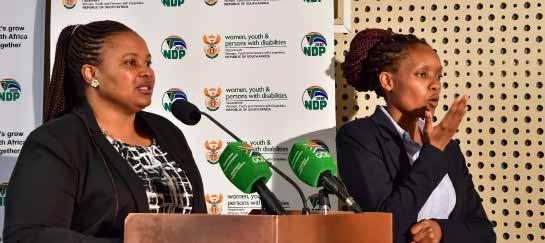
2 minute read
Calls to improve access to education for people with disabilities
The Department of Women, Youth and Persons with Disabilities (DWYPD) has emphasised the need for the allocation of resources and improved access to education for persons with disabilities. The message came as the country commemorated Disability Rights Awareness Month (DRAM) – from 3 November to 3 December.
“Imagine a South Africa where everyone can move freely and access information swiftly and effortlessly, especially persons with disabilities, and where assistive devices are easily available at a reasonable cost.
“An environment where organisations fully understand how to align their corporate social investments to the National Development Plan, with regards to empowering persons with disabilities,” the department noted in a statement.
The department explained that the creation of barrier-free environments requires collective and concurrent action by law and policy makers, service providers, regulatory bodies, the private sector as well as organisations of and for persons with disabilities.
The 2022 DRAM was held under the theme; “Empowering persons with disabilities
A man using an assistive device to take down notes.

A speaker and a sign language interpreter during the launch of DRAM.

through resourceful, sustainable and safe environments”.
“This year’s theme emphasises the importance of resolving existing barriers towards disability inclusion by ensuring resourceful, sustainable and safe environments for and with persons with disabilities and also specially recognising that not all disabilities are visible,” added the department.
Article 9 of the United National Convention on the Rights of Persons with Disabilities emphasises that State Parties have legal obligations to ensure accessibility to persons with disabilities.
In this vein, the DWYPD said the development and implementation of national laws and policies that advance accessibility must be promoted. It noted that accessibility “can be achieved by ensuring that services and information are tailored to the needs of persons with disabilities” and ensuring their participation and inclusion as well as “drawing attention to the most neglected groups within the spectrum of disability”.
The department highlighted six areas that need to be addressed in order to remove barriers to access and participation, and these include: • Changing attitudes and behaviour; • Access to the built environment; • Access to transport; • Access to information and communication; • Universal design and access; and • Reasonable accommodation measures.
It also emphasised that addressing the focus areas in their own right and as a holistic solution, requires collective and concurrent action by law and policy makers, service providers, regulatory bodies, the private sector as well as rights holders and/or their representative organisations.
Assistive technology
Assistive technology is an umbrella term that includes assistive, adaptive, and rehabilitative devices and services for persons with disabilities. These enable them to attain independence.
“They include, for example, loop systems, sub texting and alternative input for cognitive assistance and computer or electrical assistive devices. When information and communication platforms and technology are available, affordable and accessible, they significantly improve the inclusion of persons with disabilities in all aspects of society,” the department explained.
Government intends to continue upholding and promoting the rights of persons with disabilities by ensuring that all government departments prioritise their responsibility towards the Disability Rights Agenda.– SAnews.gov.za










